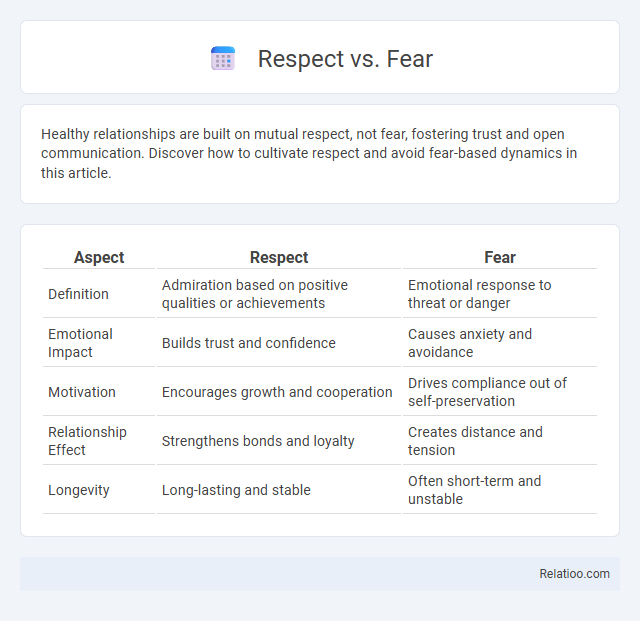Healthy relationships are built on mutual respect, not fear, fostering trust and open communication. Discover how to cultivate respect and avoid fear-based dynamics in this article.
Table of Comparison
| Aspect | Respect | Fear |
|---|---|---|
| Definition | Admiration based on positive qualities or achievements | Emotional response to threat or danger |
| Emotional Impact | Builds trust and confidence | Causes anxiety and avoidance |
| Motivation | Encourages growth and cooperation | Drives compliance out of self-preservation |
| Relationship Effect | Strengthens bonds and loyalty | Creates distance and tension |
| Longevity | Long-lasting and stable | Often short-term and unstable |
Understanding Respect and Fear: Key Differences
Respect involves recognizing someone's value and treating them with kindness, while fear is driven by anxiety or the threat of punishment, leading to avoidance or compliance. Understanding respect fosters trust and positive relationships, whereas fear often results in stress and resentment. Distinguishing these feelings is crucial for effective leadership and healthy social interactions.
Psychological Foundations of Respect and Fear
Respect arises from recognizing an individual's intrinsic worth and positive qualities, fostering trust and cooperation, while fear is rooted in perceived threats and potential harm, triggering anxiety and avoidance behaviors. Psychological foundations of respect involve empathy, emotional intelligence, and social recognition, promoting healthy relationships and social bonding. Fear relies on the amygdala's activation, which processes threats and triggers defensive responses, often undermining genuine connection and constructive engagement.
Why People Choose Respect or Instill Fear
People choose respect because it fosters trust, encourages positive relationships, and motivates others through admiration and genuine influence. Instilling fear, while effective for immediate compliance, often results in resentment, decreased morale, and short-term control rather than sustainable leadership. Your choice between respect and fear significantly impacts team dynamics, productivity, and long-term success.
Effects of Leading with Respect vs Leading with Fear
Leading with respect fosters trust, collaboration, and long-term loyalty within your team, enhancing overall productivity and morale. Fear-based leadership often results in compliance but can cause stress, reduced creativity, and high turnover rates. Your ability to inspire through respect creates a sustainable and positive work environment that drives genuine commitment.
Building Trust: The Role of Respect
Respect fosters open communication and genuine connections essential for building trust, while fear often creates barriers and inhibits honest interactions. Consideration demonstrates attentiveness to others' feelings, reinforcing respect and strengthening trust over time. Cultivating respect within relationships encourages mutual understanding, laying a solid foundation for lasting trust.
Consequences of a Fear-Based Environment
A fear-based environment often leads to decreased employee morale and reduced innovation as individuals prioritize avoiding punishment over taking initiative. Such settings foster high stress levels, increased absenteeism, and higher turnover rates, negatively impacting overall productivity and organizational stability. Conversely, respect and consideration encourage open communication, trust, and collaboration, driving sustainable success and employee well-being.
Cultivating Respect in Personal Relationships
Cultivating respect in personal relationships fosters trust, open communication, and emotional safety, setting it apart from fear, which often breeds anxiety and distance. Genuine consideration involves understanding and valuing your partner's feelings, creating a foundation where respect naturally flourishes. You can build lasting connections by prioritizing respect over fear and cultivating thoughtful consideration in every interaction.
Overcoming a Culture of Fear
Overcoming a culture of fear requires fostering an environment where respect and genuine consideration replace intimidation. Your leadership should prioritize open communication and trust, enabling individuals to express ideas without anxiety. Building this foundation encourages collaboration and innovation, breaking down barriers created by fear.
Long-Term Outcomes: Respect vs Fear
Respect fosters trust and collaboration, leading to sustainable relationships and positive long-term outcomes. Fear may result in compliance but often causes resentment and instability over time. Your environment thrives when respect is prioritized over fear, creating a foundation for lasting success.
Strategies to Foster Respect over Fear
Building trust through transparent communication and consistent actions encourages respect rather than fear in your relationships or workplace. Empowering others by recognizing their contributions and providing constructive feedback fosters mutual respect and strengthens collaboration. Prioritizing empathy and active listening ensures that people feel valued and understood, creating an environment where respect thrives over intimidation.

Infographic: Respect vs Fear
 relatioo.com
relatioo.com